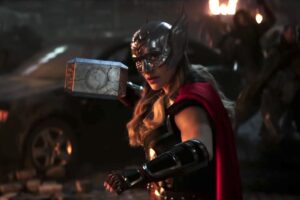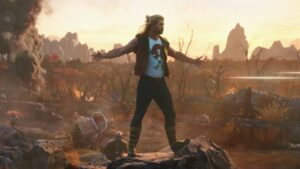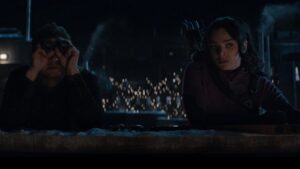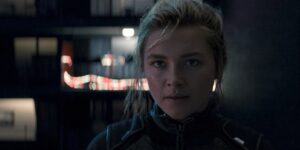MAJOR SPOILERS FOR BLACK PANTHER: WAKANDA FOREVER AHEAD!
All films have a lot riding on them. Even the most obscure arthouse films, though rarely expected to make all that much money in the handful of theaters where they’ll find available screens on which to play, still need to catch the attention of critics (or of a streaming service looking to buy up content on the cheap), while the biggest and “safest” Hollywood blockbusters still need to make a frankly ridiculous amount of money at the worldwide box-office, enough to sate the greed of studio executives and to recoup the cost of making them (ironically, the reason they’re so often “safe” from an artistic standpoint is because they’re very much not safe from a financial standpoint, and their creators, however visionary they may be, aren’t in a safe position to make demands of studios). The stress that puts on filmmakers is no joke.
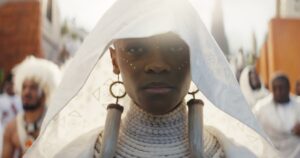
Few filmmakers would willingly shoulder another burden on top of that, particularly one as heavy as the legacy of the late Chadwick Boseman, but Ryan Coogler has made it his mission with Black Panther: Wakanda Forever to bring a much-needed sense of closure to the character Boseman portrayed in the Marvel Cinematic Universe, to fans of that character, and to himself and to Boseman’s close friends in front of and behind the camera – and the reason I believe Black Panther: Wakanda Forever succeeds at what he set out to do is because Coogler was surrounded and supported, each step of the way, by a team comprised of Boseman’s friends and people who understood his impact on the entertainment industry and the world. It is no coincidence that Wakanda Forever is a story about the importance of community in the aftermath of tragedy, and about the dangers of trying to work through grief alone; it’s not just a tribute to Boseman, but to Coogler’s entire support-system who helped him build this beautiful memorial to his friend.
When Wakanda Forever remains single-mindedly focused on accomplishing that one task, motivating its entire cast and crew to do their best work, the film is eloquent, soulful, and important, standing a full head and shoulders above all other Marvel films since the first Black Panther; particularly in the first act, when the pain of Boseman’s passing is most fresh, and in the latter half of the third act, when the emotions that accompanied it are again evoked. Between those two high points, the film is a better-than-average Marvel movie brimming with action and adventure, but cluttered with far more characters than were actually necessary to tell this self-contained story.
Most egregiously, the choice to shoehorn Contessa Valentina Allegra de Fontaine (Julia Louis-Dreyfus) into Wakanda Forever feels like the result of an unfortunate studio mandate, and her surprisingly large role in the film’s second act could easily have been whittled down to a single quick cameo, if Kevin Feige’s intention was merely to start laying the groundwork for the Thunderbolts movie she’s supposed to co-lead. Same with Everett Ross (Martin Freeman); charming fellow, but totally extraneous. These two characters are the furthest removed from the core thematic conflict of Wakanda Forever, and the time we spend with them seems especially undeserved seeing as their subplot trails off without a satisfying conclusion – presumably waiting to be picked up in another film.
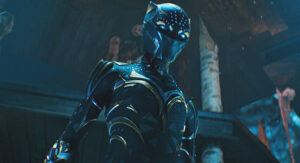
For the most part, Wakanda Forever limits its attention to the here and now, although several characters are established who will have a long future in the MCU, if there is any justice in this world. The delightfully menacing antagonist, Namor (Tenoch Huerta) a hot amphibious mutant perpetually clad in bright green gogo-boy shorts, is obviously one of these – there is a historical precedent in the comics for him interacting with Wakanda, the Fantastic Four, and the X-Men (and recently, it’s become nearly impossible to scroll through Twitter without running into a joke about Sue Storm leaving her husband for Namor, something that has never actually happened in the comics but is still an oddly appealing idea to a lot of people), and his MCU counterpart has unfinished business with the Black Panther who brutally strong-armed him and his people into a truce after he nearly brought Wakanda to its knees. He’ll be back, and frankly I can’t wait: Namor is up there with Killmonger as one of the MCU’s most interesting, fully fleshed-out villains, not to mention the most devastatingly beautiful.
I can only pray that Michaela Coel, after being relegated to the sidelines in this story, will someday get another chance in the role of Aneka, an endearingly defiant member of the Midnight Angels (an autonomous subdivision of the Dora Milaje, who protect the royal family of Wakanda). Aneka is one of Marvel Comics’ most prominent queer characters, although that aspect of her character is only briefly hinted at near the end of the film, when she and Ayo (Florence Kasumba), her lover in the comics, share a deliberately chaste kiss on the forehead. It’s a disappointing debut for such an interesting character, portrayed by such a talented actress – but much like how Ayo herself was essentially an extra in Black Panther before she became an actual character (with her own small fandom) in The Falcon And The Winter Soldier, I can foresee Aneka becoming extremely popular, particularly with LGBTQ+ fans, if given a sizable role in a Disney+ series…like, say, the Wakanda series that Ryan Coogler is apparently producing, that still has no cast or crew attached to it almost two years since its announcement.
Though I may be in the minority who actually liked the look of the Midnight Angels’ distinctive blue armor in live-action (but even if you hated it, I think we can all agree that Ruth E. Carter’s costume design was overall stunning and Oscar-worthy), I’d love to see the concept used again, and properly this time. As for their coolness factor (a necessary part of any superhero’s persona), the Midnight Angels are finally deployed in the third act battle as a last resort by the Wakandans, but apart from their suits allowing them to fly and dive underwater, they’re not outfitted with the kinds of cool gadgets and high-tech weaponry I was eagerly anticipating by that point. Luckily, they do have Okoye (Danai Gurira), who joins the Angels after being expelled from the Dora Milaje, and you need only put a vibranium spear in that woman’s hands for an instantly iconic action sequence to just happen.
In the absence of a Black Panther throughout most of the film, no one else besides Namor and his lieutenants come close to matching Okoye’s prowess on the battlefield until the third act, when Shuri (Letitia Wright), the actual star of Wakanda Forever, dons the Black Panther mantle at long last before launching herself recklessly into a no-holds-barred duel with Namor on the beach, where her objective is to prevent him from reaching the water and regenerating his strength (a twist on the story of Antaeus, a character from Greek mythology who could not be defeated while his feet touched the ground). At the end of the day, brains win out over brawn, but Shuri does put her panther-claws to good use, so I think it’s safe to say she’s a full-fledged action hero at this point…or perhaps antihero would be the more appropriate term?

Shuri’s character arc in Wakanda Forever takes her to a very dark place from which it’s difficult (though in my opinion, still too easy) to extricate herself in the third act, when the accumulated rage she’s bottled up inside her heart breaks free of its fragile vessel and takes control of her with little resistance: rage over T’Challa’s tragic death at the beginning of the film, which Shuri missed while frantically seeking a cure to his illness in her lab, and over Ramonda (Angela Bassett)’s death at the hands of Namor; rage at the goddess Bast for allowing them both to die and for preventing Shuri from visiting either of them in the afterlife; and a general, all-encompassing rage at the world, which she tells Namor (in a moment of vulnerability) she would burn to the ground just to feel something again. It’s no surprise that Killmonger (Michael B. Jordan) appears to her when she first enters the Ancestral Plane – because at that point, she’s not seeking guidance but validation for the violence she knows she’s about to unleash upon the world, and he’s the one person who understands.
Or so she thinks. What Shuri refuses to acknowledge, even to herself, is that she’s actually a lot like Namor, in that both of them are still beating themselves up about a tragedy in their lives that they’ve never moved on from (the inciting incident in Namor’s origin story was the Spanish conquest of Mexico in the 16th Century, which forced his people to take refuge in the depths of the ocean). Both of these characters have a community at their backs who would support them, but crucially, they’ve both been isolating themselves from their communities for a long time – Shuri by outwardly pretending that she’s fine while privately hurting, and Namor by adopting the role of an aloof god-king inaccessible to most of his people (as one does). They’re only ever emotionally honest with each other, which is partially why some fans are aggressively shipping the two (that, and enemies-to-lovers ships are always popular, although it’s still relatively rare to see any ship featuring an unambiguously Black woman – coupled with a brown Indigenous man, no less – gain traction in the mainstream at the rate this one has).
But while they’d make for one hot power couple, I maintain that Riri Williams (Dominique Thorne), who has been rumored to be bisexual in the MCU, was coyly trying to ask Shuri out on a date at the end of the film. There’s chemistry there that I’d like to see further explored in the Ironheart Disney+ series. Sure, I might just be inventing queer subtext to make up for the lack of Aneka and Ayo, but Shuri needs Riri in her life, whether as a love interest or a friend; someone her own age whom she can talk to without any strings attached, who intimately understands grief (canonically, Riri’s father died before she was born, and her step-father was killed in a shooting) but has had time to adjust and move forward with her life.
From the opening scene onwards, Wakanda Forever is sad – but until the second act, it’s sad for all the reasons we expected it to be. Then the film delivers a shocking emotional gut-punch by killing Angela Bassett’s Ramonda, the solid rock upon which Wakanda rebuilt itself following T’Challa’s death. Bassett was one of the franchise’s unparalleled stars, delivering magnificent performances in both Black Panther films but especially in this one, where her role was greatly expanded…and to lose her so suddenly, almost unceremoniously, without even a final word of farewell to her daughter, just felt cruel. It would hurt less if the film had adequate time to mourn her properly, but following a quick funeral we rush on to the third act battle and Ramonda appears again only for a split-second on the Ancestral Plane. At least she slayed in her dozen or so different royal outfits (seriously, Oscars all around for the costuming department).
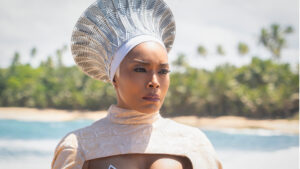
In conclusion, Wakanda Forever knows what it wants to say and delivers its message eloquently when it stays focused long enough to do so – which is admittedly difficult when the film has so many subplots it wants to pursue and so many characters clamoring for more screentime. It is, however, the satisfying send-off to Chadwick Boseman that it needed to be, and a decent middle-chapter in the story of Wakanda and its continued struggle with the outside world. But on that note, I also hope that Ryan Coogler is allowed some much-needed time off before jumping into his next project for Marvel, because the unique stress of making this particular film, compounded with the usual stress of making any film, cannot have been easy to handle, even with the support of a team.
Film Rating: 8.5/10

